Manual washing machine review
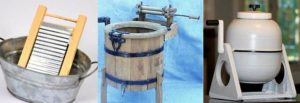 Eco-technologies are firmly entering our lives, no matter how much we, in some cases, resist it. So the familiar automatic washing machine now has an alternative - a manual washing machine. What kind of washing machines are these, what advantages and disadvantages they have and how to use them, we will talk about all this on the page of this publication. In addition, we will provide an overview of such technology so that you can look at it using examples of specific models.
Eco-technologies are firmly entering our lives, no matter how much we, in some cases, resist it. So the familiar automatic washing machine now has an alternative - a manual washing machine. What kind of washing machines are these, what advantages and disadvantages they have and how to use them, we will talk about all this on the page of this publication. In addition, we will provide an overview of such technology so that you can look at it using examples of specific models.
What washing machines will we be talking about?
A manual washing machine is a rather broad definition that does not fit most models of washing machines on the market today. How is this a manual machine? Let's first define the terminology and clarify which washing machines we will call manual. After much thought and market analysis, our specialists came up with the idea that the majority of experts around the world understand hand washers as any washing devices that operate without electricity.
A washing machine without electricity is a mechanical device that operates completely independently of any communications.
If this is really the case, then we must keep in mind, first of all, models of washing machines that work thanks to human muscular power. These are portable camping washing devices designed to make life easier for tourists and summer residents. They don’t always look like the automatic or semi-automatic washing machines we are used to, but they perform their function well.
Pros and cons of such washing machines
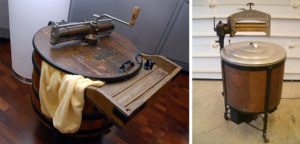 The age of washing machines began with primitive mechanical models, which washed clothes very mediocrely. It was easier to take soap and a washboard and wash the clothes without resorting to any dubious devices. Since then, a lot has changed; mechanical hand washers were replaced by electric semi-automatic ones, and then by electronic fully automatic “home assistants”.
The age of washing machines began with primitive mechanical models, which washed clothes very mediocrely. It was easier to take soap and a washboard and wash the clothes without resorting to any dubious devices. Since then, a lot has changed; mechanical hand washers were replaced by electric semi-automatic ones, and then by electronic fully automatic “home assistants”.
What do we see in the 21st century? Mechanical washing machines are appearing again. What is this, a step towards a bright future or a rollback to the past? More likely the former than the latter, because modern mechanical washing machines are not at all similar to their predecessors, which were invented already in the second half of the 19th century. Let's look at their advantages and disadvantages, and then we will draw conclusions. Let's start with the advantages.
- Small sizes. In some cases, mechanical washing devices can easily fit into a small washing machine trunk, or even into a backpack, which allows them to be used on the go.
- Full autonomy. Hand washers do not require an electrical connection or hot or cold water supply. I collected some water from the stream, heated it with a pot right on the fire, and then poured it into the washing machine - and you are no longer dependent on the benefits of civilization.
- Minimum costs. Although the hand- or foot-operated machine itself is not cheap, you will definitely save on water and electricity, which is not superfluous in these difficult times.
- Simplicity of design. Hand washers are easy to use and very reliable. They can last a very long time, making life much easier for the user.
- Taking care of things.Manual machines do not damage clothes because they do not operate at high speeds and do not exert excessive mechanical stress on the fabric.
- Speed wash. Such washing machines do not have long washing cycles, which means you can really save your time.
We talked about the advantages of a manual washing machine; as you can see, it has quite a lot of advantages. Now it's time for the shortcomings. We don't do advertising, so we won't hide anything from you.
- Mechanical washing machines usually have small loads, so you cannot wash a large amount of laundry in them.
- The washing efficiency of such machines is satisfactory, but they are still far from automatic machines.
- These machines don't break down very often, but if they do, you'll be at a loss to find someone who can fix them.
- When washing in such a machine, you are putting in manual labor, and this in itself is not very good, because the machine was invented in order to minimize or eliminate manual labor. In addition, during washing you will not go anywhere, you will have to sit and turn the handle or press the pedal.
- Mechanical machines only wash and rinse clothes, spinning, and especially drying are not available to them.
The forced time costs associated with the use of manual washing machines also include the time spent heating the water. On a hike, if you heat water over a fire, you will spend at least 30-40 minutes.
Review of washing machines without electricity
As promised, within the framework of this paragraph we will provide a review of mechanical washing machines that are capable of working completely autonomously. Let’s make a reservation right away that there are no domestic mechanical washing machines on the market, so we will only talk about foreign samples, which, however, are also sold in the CIS countries.
Wonderwash.A great little washing machine that can work autonomously, but if necessary it is connected to the water supply through a special hose. The mechanism is operated manually by rotating a special handle. All this is very reminiscent of a manual meat grinder. The machine washes quite well, although the maximum load leaves much to be desired - it is 2.2 kg. Washing requires about 3 liters of water and about the same for rinsing. This machine uses vacuum stain removal technology.
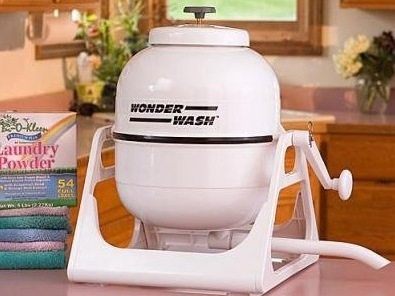
Drumi from YIREGO. And this is no longer a manual, but a foot-operated washing machine, which was invented in Canada. The machine operates entirely mechanically and is operated by pressing the pedal repeatedly with your foot. Drumi consumes no more than 5 liters of water per wash, and can wash up to 2.2 kg of laundry. In addition, this is one of the few mechanical machines capable of spinning clothes. More details foot washing machine Drumi is described in the article of the same name posted on our website.
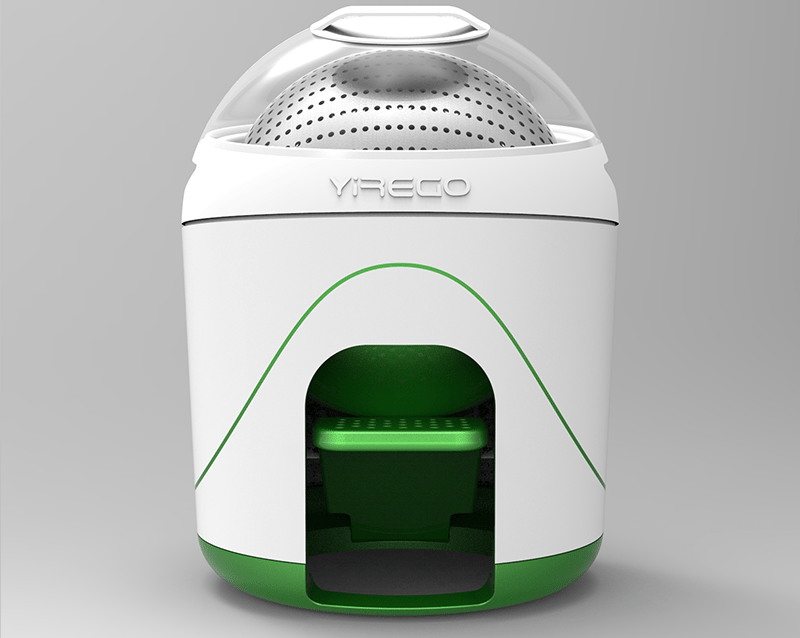
Scrubba. And this is nothing like a washing device at all, which the author, oddly enough, calls a washing machine. However, we think that this device is still a device, and not a machine, but we will not argue with the patent holder. Scrubba was invented in Australia by a local avid tourist. This is, in fact, a bag that has an extensive corrugated surface inside. It works like this:
- put your laundry in the Scrubba bag;
- pour up to 13 liters of water there, add powder;
- you put the bag on the ground and begin to intensively roll it with your hands on the ground;
- the laundry inside is actively rinsed and rubs against the corrugated walls of the bag, the dirt is washed off.
Users of Scrubba note the low cost, high quality of washing and very small dimensions and weight as the advantages of the machine. This device weighs 150 grams without water.
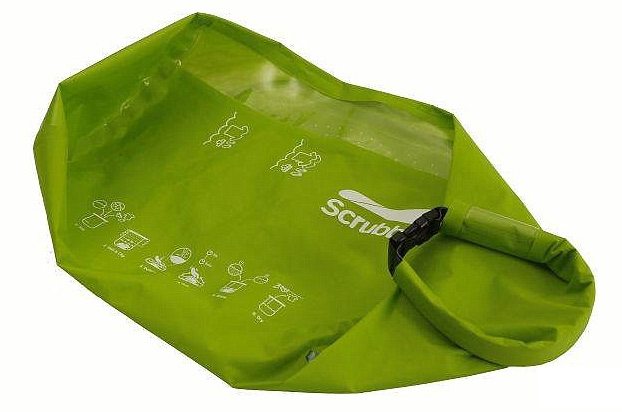
Shaking Washer. This is another manual washing machine that does, however, require batteries. This little machine really looks like a bartender's shaker. And the principle of its operation also resembles the manipulations of this “drinks guru” who works his magic behind the counter, mixing cocktails.
The Shaking Washer is marketed as a sock machine. You can actually wash several pairs of socks in it. We put the laundry in the container, pour water, pour in the powder, close the lid and vigorously shake the machine from side to side, then all we have to do is take the clean laundry out of the container, wring it out and hang it to dry.

In conclusion, we note that manual washing machines are a magnificent invention, for which not a single generation of tourists and summer residents will thank you. However, one must understand that such a manual washing machine will not replace a modern automatic washing machine, and the inventors did not have the goal of making a revolution in global mechanical engineering. Manual machines occupy their own small sector of the washing machine market, with no plans to go beyond it.
Interesting:
Reader comments
- Share your opinion - leave a comment

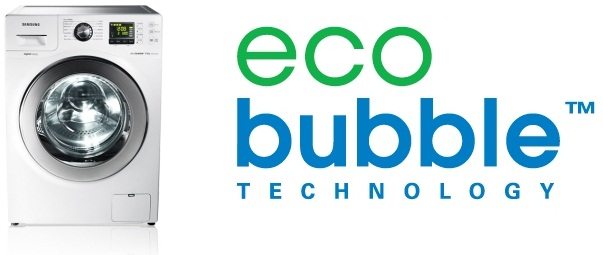


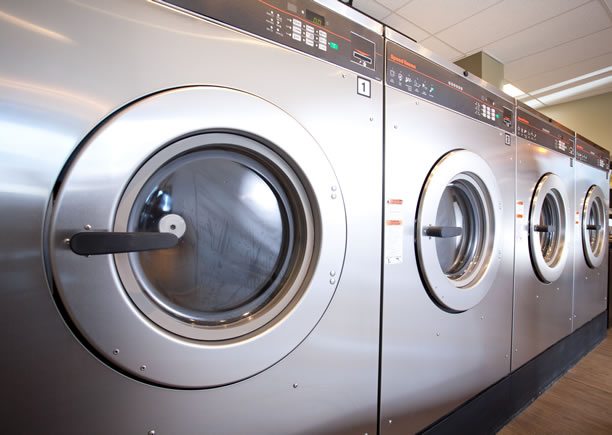

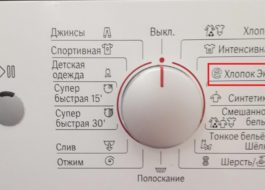


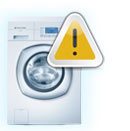
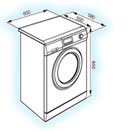


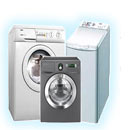
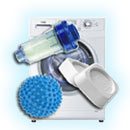


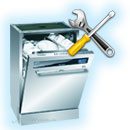
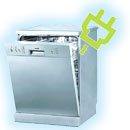

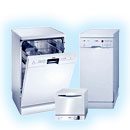
Add a comment